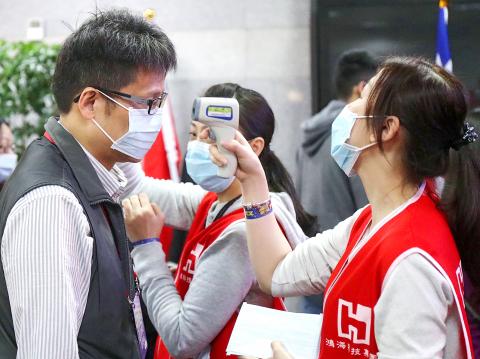Hon Hai Precision Industry Co Ltd (鴻海精密), a key supplier to Apple Inc, has asked its Taiwanese employees who work at its plant in Wuhan, China, but are back in Taiwan for the Lunar New Year holiday to stay home, given the new coronavirus outbreak in the city.
Hon Hai, known internationally as Foxconn Technology Group (富士康科技集團), yesterday said that no health problems had been found so far in its Wuhan-based employees who had returned to Taiwan for the holiday, but it had asked them not to attend the annual year-end party in Taipei yesterday, and to stay home during the holiday in case of any contagion.
“We also urge any colleague who had been to Wuhan over the past two weeks to report to the company and rest at home for safety’s sake,” company founder Terry Gou (郭台銘) said in his speech at the party.

Photo: CNA
“2020 is full of challenges,” Gou said. “The outbreak of coronavirus is one of them.”
“The speed of contagion will be no less than Severe Acute Respiratory Syndrome,” he said, referring to the 2002-2003 epidemic that started in China and killed nearly 800 people globally.
“I advise everyone not to go to the mainland for this coming new year holiday,” he added.
The company stepped up health checks at the party at the Nangang Exhibition Hall, including providing 35,000 facemasks and checking everyone’s temperature as they entered the venue.
Since the outbreak, Foxconn workers in Wuhan have been wearing facemasks and getting their temperature checked, the company said.
Management has to decide whether those Taiwanese who work in Wuhan need to return there to work after the holiday, Gou said.
Management needs to come up with solutions such as video conference systems for employees if they are to work remotely from Taiwan, Gou said.
Hon Hai is expected to get through this situation, as it had been trained and survived SARS, he added.
Additional reporting by Bloomberg

Merida Industry Co (美利達) has seen signs of recovery in the US and European markets this year, as customers are gradually depleting their inventories, the bicycle maker told shareholders yesterday. Given robust growth in new orders at its Taiwanese factory, coupled with its subsidiaries’ improving performance, Merida said it remains confident about the bicycle market’s prospects and expects steady growth in its core business this year. CAUTION ON CHINA However, the company must handle the Chinese market with great caution, as sales of road bikes there have declined significantly, affecting its revenue and profitability, Merida said in a statement, adding that it would

MARKET LEADERSHIP: Investors are flocking to Nvidia, drawn by the company’s long-term fundamntals, dominant position in the AI sector, and pricing and margin power Two years after Nvidia Corp made history by becoming the first chipmaker to achieve a US$1 trillion market capitalization, an even more remarkable milestone is within its grasp: becoming the first company to reach US$4 trillion. After the emergence of China’s DeepSeek (深度求索) sent the stock plunging earlier this year and stoked concerns that outlays on artificial intelligence (AI) infrastructure were set to slow, Nvidia shares have rallied back to a record. The company’s biggest customers remain full steam ahead on spending, much of which is flowing to its computing systems. Microsoft Corp, Meta Platforms Inc, Amazon.com Inc and Alphabet Inc are

RISING: Strong exports, and life insurance companies’ efforts to manage currency risks indicates the NT dollar would eventually pass the 29 level, an expert said The New Taiwan dollar yesterday rallied to its strongest in three years amid inflows to the nation’s stock market and broad-based weakness in the US dollar. Exporter sales of the US currency and a repatriation of funds from local asset managers also played a role, said two traders, who asked not to be identified as they were not authorized to speak publicly. State-owned banks were seen buying the greenback yesterday, but only at a moderate scale, the traders said. The local currency gained 0.77 percent, outperforming almost all of its Asian peers, to close at NT$29.165 per US dollar in Taipei trading yesterday. The

The US overtaking China as Taiwan’s top export destination could boost industrial development and wage growth, given the US is a high-income economy, an economist said yesterday. However, Taiwan still needs to diversify its export markets due to the unpredictability of US President Donald Trump’s administration, said Chiou Jiunn-rong (邱俊榮), an economics professor at National Central University. Taiwan’s exports soared to a record US$51.74 billion last month, driven by strong demand for artificial intelligence (AI) products and continued orders, with information and communication technology (ICT) and audio/video products leading all sectors. The US reclaimed its position as Taiwan’s top export market, accounting for